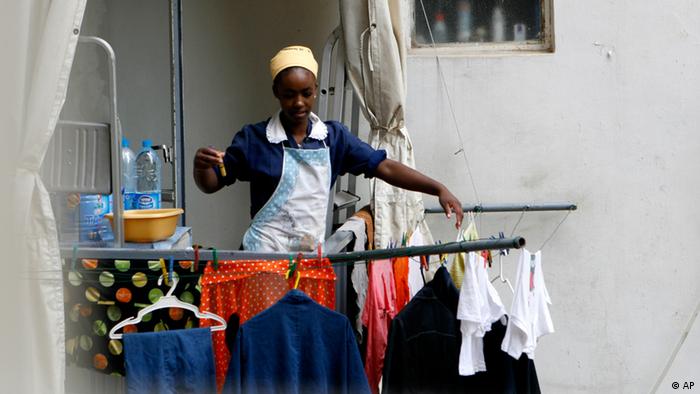
Thousands of young women travel to countries like the United Arab
Emirates hoping to earn a better living. But many end up exploited,
abused, threatened and isolated by their employers, with nowhere to go
for help.
We will call her Almaz, as she does not wish to reveal her true name.
She is 23 years old and left her home in Ethiopia in search of a better
life. For the last 10 months she has been working as a housemaid in
Dubai, United Arab Emirates.
Like many young women in Ethiopia, Almaz had difficulties finding a job. And even when work was available, the pay wasn't enough to live on.
"I started an apprenticeship to become a chef," Almaz said. "After paying half of the fee I didn't have any money left. I needed to pay my rent and for my food and schooling - how was I supposed to get by on 400 birr [ 17 euros, $22]?"
In these circumstances, the job in Dubai sounded like a good opportunity, with a wage of $170 per month. Excited, she signed a two-year contract, trying not to think about all the negative things she had heard about working conditions in Dubai. After all, she knew of girls who had "made it" there - or at least had earned enough to send money home, which equaled success in their families' eyes.
Slave labor
 Numerous cases of domestic worker abuse have emerged from Saudi Arabia
The relatives of such women rarely learn about the degradation some
foreigners suffer at the hands of their employers. Almaz said she found
herself in a similar situation to many other foreign maids in Dubai. In a
hushed voice, she described her experience on the phone to DW as one of
violence, sexual harassment and inhuman working conditions.
Numerous cases of domestic worker abuse have emerged from Saudi Arabia
The relatives of such women rarely learn about the degradation some
foreigners suffer at the hands of their employers. Almaz said she found
herself in a similar situation to many other foreign maids in Dubai. In a
hushed voice, she described her experience on the phone to DW as one of
violence, sexual harassment and inhuman working conditions.
Almaz is forced to work up to 20 hours a day. On days when there is less to do in the family home, her boss sends her to cook and clean at her brother's house. "I wish I had stayed at home," Almaz said. But she cannot return to Ethiopia: her passport was taken away from her on arrival in Dubai.
Lack of protection
Almaz's experience is similar to that of hundreds of thousands of young female workers in the Middle East. In Lebanon alone, there are 200,000 foreign domestic workers - in a total population of 4 million. The numbers are estimated to be even higher in Saudi Arabia.
The main responsibility for the rights of these migrants is carried by the host country, said Nadim Houry, deputy director of the Middle East and North Africa division at Human Rights Watch and director of Human Rights Watch's Beirut office.
"When abuse occurs, the case should be dealt with by the justice system and police in the host country," said Houry.
But in reality things are different. Even though countries like Jordan and Lebanon have created laws to protect foreign domestic workers, Houry said the laws are not being applied.
"The women's home countries have the second degree of responsibility for their safety," added Houry, naming the Philippines as a positive example.
Filipino embassies have set up hotlines that women in trouble can call, and in some cases they offer emergency accommodation. However, they are the exception. The Ethiopian embassy in Saudi Arabia did not respond to DW's telephone and written enquiries on the matter - nor does it respond to direct enquiries from affected domestic workers.
Sexual abuse
Almaz said she feels lonely in her struggle. She recalls one frightening encounter: "While I was working, a man who is employed as a driver came in and made sexual advances on me. I ran into the boss's room, locked the door and screamed." The incident did not result in any punishment for the man.
Her experience is not an isolated case. Almaz said a friend of hers was raped by her employer who threatened to stop paying her if she resisted.
Almaz said she the only way out of the situation will be to wait it out. Her contract in Dubai ends in 14 months. She hopes to then get her passport back and return to Ethiopia.
Like many young women in Ethiopia, Almaz had difficulties finding a job. And even when work was available, the pay wasn't enough to live on.
"I started an apprenticeship to become a chef," Almaz said. "After paying half of the fee I didn't have any money left. I needed to pay my rent and for my food and schooling - how was I supposed to get by on 400 birr [ 17 euros, $22]?"
In these circumstances, the job in Dubai sounded like a good opportunity, with a wage of $170 per month. Excited, she signed a two-year contract, trying not to think about all the negative things she had heard about working conditions in Dubai. After all, she knew of girls who had "made it" there - or at least had earned enough to send money home, which equaled success in their families' eyes.
Slave labor
 Numerous cases of domestic worker abuse have emerged from Saudi Arabia
Numerous cases of domestic worker abuse have emerged from Saudi Arabia
Almaz is forced to work up to 20 hours a day. On days when there is less to do in the family home, her boss sends her to cook and clean at her brother's house. "I wish I had stayed at home," Almaz said. But she cannot return to Ethiopia: her passport was taken away from her on arrival in Dubai.
Lack of protection
Almaz's experience is similar to that of hundreds of thousands of young female workers in the Middle East. In Lebanon alone, there are 200,000 foreign domestic workers - in a total population of 4 million. The numbers are estimated to be even higher in Saudi Arabia.
The main responsibility for the rights of these migrants is carried by the host country, said Nadim Houry, deputy director of the Middle East and North Africa division at Human Rights Watch and director of Human Rights Watch's Beirut office.
"When abuse occurs, the case should be dealt with by the justice system and police in the host country," said Houry.
But in reality things are different. Even though countries like Jordan and Lebanon have created laws to protect foreign domestic workers, Houry said the laws are not being applied.
"The women's home countries have the second degree of responsibility for their safety," added Houry, naming the Philippines as a positive example.
Filipino embassies have set up hotlines that women in trouble can call, and in some cases they offer emergency accommodation. However, they are the exception. The Ethiopian embassy in Saudi Arabia did not respond to DW's telephone and written enquiries on the matter - nor does it respond to direct enquiries from affected domestic workers.
Sexual abuse
Almaz said she feels lonely in her struggle. She recalls one frightening encounter: "While I was working, a man who is employed as a driver came in and made sexual advances on me. I ran into the boss's room, locked the door and screamed." The incident did not result in any punishment for the man.
Her experience is not an isolated case. Almaz said a friend of hers was raped by her employer who threatened to stop paying her if she resisted.
Almaz said she the only way out of the situation will be to wait it out. Her contract in Dubai ends in 14 months. She hopes to then get her passport back and return to Ethiopia.
No comments:
Post a Comment